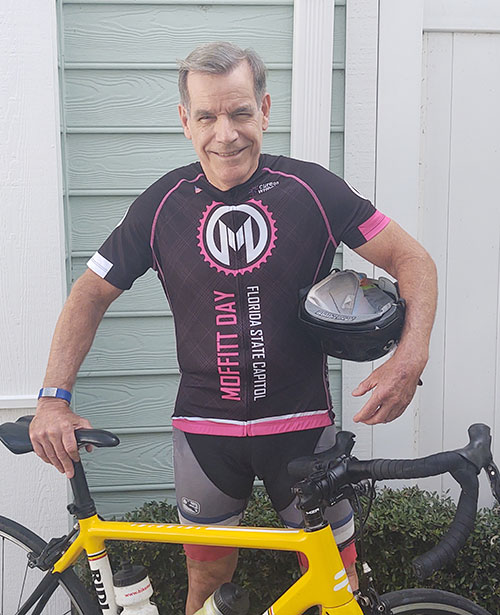Nearly Four Decades of Survival and Counting
In 1986, I was a busy engineering student with graduation in sight, but I started frequently getting what I thought was the flu. One weekend, I was talking to my parents on the phone when I started coughing and losing my voice, which was happening a lot by then. When my parents showed up at my place the next day, they took me to the hospital – which, as it turned out, saved my life.
My first day in the intensive care unit, a doctor asked me, “John, do you know what cancer is?” Recalling my biology class, I said, “uncontrolled cell growth.” He responded, “You’re being very logical about this,” and left. They were trying to tell me I had cancer, but things were happening fast and I just wasn’t getting it. After all, I was 26 years old, strong and couldn’t possibly have cancer !
!
After a whirlwind of tests and procedures, doctors told me I had a tumor the size of a grapefruit in my chest cavity. I had stage 4 primary mediastinal large B-cell lymphoma (PMBCL), a type of non-Hodgkin lymphoma. I didn’t understand most of what they were telling me, but I realized it was bad. A priest administered the last rites, which helped because at least I could sleep at night feeling that I was spiritually prepared to die. Sometime later, I asked my oncologist what my chances of surviving were, and he responded, “We’re guardedly optimistic.” At the time, this response was incredibly helpful and hopeful – just what I needed. So, a week later, I registered for the fall school term determined to do everything I could do to survive. I wanted to have a life to go back to.
Chemotherapy and radiation were awful but saved my life. However, surviving cancer was only half the battle. Until the Americans with Disabilities Act (ADA), young cancer survivors were legally denied employment because we had cancer. I was born in Canada, so I got a job there after being denied dozens of times in the states. However, after the ADA became law, I found a job in the U.S. and I went on with my life.
I thought I was done with cancer, but I discovered a large lump in 2003. I knew with dread what it was, but an emergency appendectomy revealed diffuse large B-cell non-Hodgkin lymphoma. When my oncologist told me that I needed chemotherapy again, it was devastating. Chemotherapy had been so awful and almost killed me the first time. He patiently and confidently reassured me that the past chemotherapy regimen was no longer used today because it was too toxic. Sure enough, I was amazed at how much easier chemotherapy had become and it saved my life again.
Nowadays, I continue to benefit from the amazing progress made within cancer research as I receive preventive care and treatment for the long-term consequences of the medicine that originally saved my life four decades ago. I volunteer at Moffitt as an advocate, peer visitor and Comfort Companion. I also ride in the annual Cure on Wheels 326-mile bicycle ride to Tallahassee as a testament to my care. Most of my life has been made possible by the advances in medical science and the amazing care from my nurses and doctors. And I am profoundly grateful. I volunteer at Moffitt to say thank you for saving my life, and to use my experience of cancer and survivorship to help other patients.
DesRoches will be pedaling 326 miles again for the 14th annual Cure on Wheels advocacy ride as part of Moffitt Day in Tallahassee in 2024. If you’d like to support Moffitt’s mission to prevent and cure cancer, visit CureOnWheels.org
